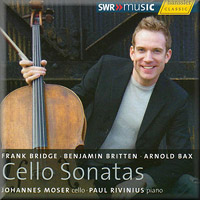Bax’s Legend-Sonata and sonatas by Britten and Bridge- Review by Richard R. Adams
Cello Sonatas by Bridge, Britten and Bax
Johannes Moser, Cello
Paul Rivinius, Piano
Hanssler Classic 93257
Review by Richard R. Adams
This is the sort of release that I find very reassuring as it features an internationally renowned instrumentalist recording three English cello works; two of which are rarely played outside the UK and here they’re performed with a level of sensitivity and understanding that you’d expect from someone with a long association with this music although I doubt that is the case here. Benjamin Britten is an internationally known composer but Bax and Bridge remain fringe figures outside of England but this disc suggests their status may be changing and I have no doubt this recording will introduce their music to an ever-growing audience.
A quick review of Johannes Moser‘s recorded repertoire reveals he is an extremely adventurous musician. Moser’s CD programs often feature a well known composer such as Shostakovich or Brahms and then supplement the main work with related but lesser known fare by composers such as Boris Tchaikovsky and Mieczyslaw Weinberg (as on the Shostakovich disc). This new recording is arranged similarly in that it features the well known Britten Cello Sonata and then groups it with the lesser known Bridge Sonata and the rarely-heard Bax Legend-Sonata. It makes sense to couple the Bridge and Britten Sonatas as the two composers are so closely identified but including the Bax is a real coup as there are several great British cello sonatas that Moser could have chosen including the masterly Moeran sonata, which may just be the finest of all. I’m not sure how Moser came to Bax but I hope he continues to explore this repertory as I’d love to hear what an impassioned account he could give of the Rhapsodic Ballad or the delightful Folk-Tale for cello and piano.
The disc begins with Bridge’s two-movement Cello Sonata, which the composer started before the onset of WW I and finished a few years into the war in 1917. It was premiered in the USA in 1923 and it remains a benchmark work as it’s here that we see the first signs of the more European-influenced and inward-looking composer whom Bridge was to become after the war ended. Bridge was a committed pacifist and he was traumatized by the loss of so many friends as well as the millions of soldiers and civilians who died during the First World War. The second movement of his Cello Sonata was his first response to the carnage and it sounds as though he’s been overtaken by a nightmare that he is aware cannot end. It’s a tumultuous work and requires playing by both cellist and pianist that is fully sympathetic to both the romantic as well as despairing moods of the work and in this regard Moser and pianist Paul Rivinius are perfect. Rostropovich and Britten provide an urgency that is unique to their relationship but Moser’s playing is just as deeply felt and is perhaps more subtle and restrained. Hearing Moser in this works makes me long to hear what he’d do with Bridge’s ultimate masterpiece, the tragic Oration for Cello and Orchestra and I hope he adds it to his repertory.
The amazingly inventive and haunting Cello Sonata by Britten follows and it’s played with all the technical brilliance and control that’s required of this astounding piece. This work has been recorded numerous times but I’ve only heard the Rostropovich and again it has special status given the composer’s involvement but this new Hanssler recording is just as successful and the recording is, if anything, even more natural and lifelike than the classic Decca from the late 1960s. Those interested in the Bridge and Bax will surely be well served by having this great new recording of the Britten in their library as well.
Bax’s Legend-Sonata is another one of those “late” Bax works that challenge the long-held assumption that Bax had little inspiration left after he completed his last symphony. The Legend-Sonata finds Bax at near the top of his form and must be regarded as one of his most pleasing chamber works. It certainly comes as something of a relief to hear the genial Bax following all the horror and nightmares the Bridge and Britten works conjure and I think it was wise planning to put it last on the disc. That’s not to say the Bax is light weight – it certainly isn’t, but it’s wonderfully tuneful and serene and the glorious slow movement takes as its theme a shortened version of Fand’s song of Immortal Love, and it’s reference here is quite moving as it shows Bax in very reflective mood as if looking back longingly over the years to that time in his life when he was most on fire as an artist and had created his most perfect work.
The Legend-Sonata should not be mistaken for Bax’s earlier Cello Sonata, which uses the opening of Spring Fire as the theme for its slow movement. That sonata is more discursive and has not found much favor among cellists and sadly the same is true of the Legend-Sonata although I suspect more cellists will take it up after hearing this wonderfully evocative and expressive performance by Moser. The only other recordings include Florence Hooton’s mono recording on Lyrita, recently reissued but still sounding ancient despite a nice mastering, and an ASV recording with Bernard Gregor-Smith that is an essential purchase as it features all of Bax’s works for cello and piano on one disc and all very well played too but this new recording on Hanssler provides both a recording and performance that is of the very highest quality and advocates a work by Bax that deserves to be far better known.
